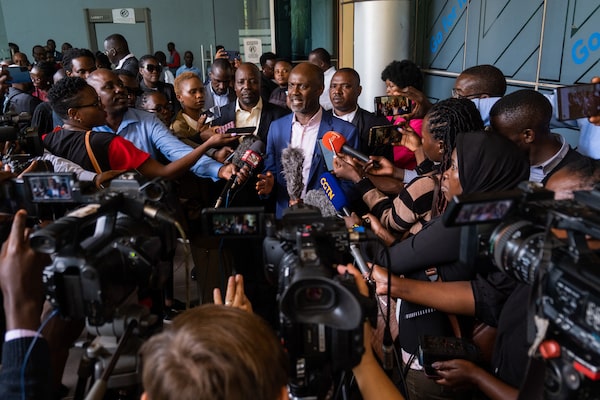A panel of five Constitutional Court Judges of Uganda led by the Deputy Chief Justice of Uganda Richard Buteera read their joint judgement at the Constitutional Court, where the Court upheld the anti-LGBTQ Law in Kampala, Uganda on April 3.Abubaker Lubowa/Reuters
Uganda’s constitutional court has upheld most provisions of the country’s anti-gay law, one of the world’s harshest, citing the U.S. Supreme Court’s recent abortion ruling as support for the decision.
The law, which authorizes the death penalty for the vaguely defined act of “aggravated homosexuality,” was largely upheld in the 203-page court judgment on Wednesday, after a legal challenge by human rights activists.
The court struck down four of the law’s provisions, including criminal penalties for those who lease premises to gays and those who fail to report suspicions of same-sex relationships.
Critics have said the U.S. Christian evangelical movement has had a major influence on Ugandan politicians, who passed the anti-gay law this past May. A number of U.S. Christian leaders have organized conferences in Uganda and lobbied the country’s politicians.
The Ugandan judgment cited the U.S. Supreme Court ruling in the 2022 Dobbs case as justification for its ruling. The Dobbs decision allowed states to pass anti-abortion laws.
“The U.S. Supreme Court considered the nation’s history and traditions, as well as the dictates of democracy and rule of law, to overrule the broader right to autonomy,” the Ugandan court said.

Ugandan journalist Andrew Mwenda, one of the petitioners challenging the constitutionality of the Anti-Homosexual Act, speaks to the media after the delivery of the judgment in Kampala.BADRU KATUMBA/Getty Images
The U.S. court “held that it was time to return the permissibility of abortion and the limitations thereon to the people’s elected representatives as demanded by the Constitution and the rule of law,” the judgment added. “That is precisely what was done with the issue of homosexuality in Uganda.”
Human rights groups said they are alarmed by the Ugandan court’s citing of the U.S. abortion ruling. “This could point to influence on Uganda’s judiciary by the U.S. extremist hate groups who funded that U.S. Supreme Court challenge,” said a statement from Convening for Equality, a coalition of Ugandan rights organizations.
The court’s decision to nullify four clauses in the law was “merely window dressing” in a bid to persuade international donors to restore funding to Uganda, the group said.
The Ugandan law has led to hundreds of arrests and attacks on LGBTQ+ people. Human rights groups have documented a lengthy list of cases of Ugandans being evicted from their homes, dismissed from their jobs, detained or tortured by police or attacked on the streets. The law has also led to attempts at similar anti-gay legislation in other African countries, including Ghana, Kenya, Tanzania and South Sudan.
Uganda Human Rights lawyer Nicholas Opiyo stand with activists at the Constitutional Court after the Court upheld the anti-LGBTQ Law in Kampala.Abubaker Lubowa/Reuters
The Ugandan law sparked a global wave of outrage and condemnation. The World Bank suspended all new lending to Uganda, and the United States announced restrictions on visas for Ugandan officials.
The Ugandan court ruled that the anti-gay law is a reflection of public opinion in the country. “The dogged, indefatigable commitment of the legislature to the enactment of an anti-homosexuality law would suggest that it captures societal sentiments on the subject of homosexuality,” it said.
Nicholas Opiyo, a human rights lawyer who represented some of the groups challenging the law, criticized the court for relying on “vague cultural-values arguments” in its ruling. “You come to court expecting it to rise above public bigotry and sentiments,” he said in a social media post after the ruling.
In the country’s parliament, Ugandan MPs applauded loudly when the court ruling was announced. “We are happy with the outcome,” deputy speaker Thomas Tayebwa told the chamber.
But rights groups said they are already preparing to go to Uganda’s Supreme Court to appeal the court decision. “This ruling is wrong and deplorable,” said Frank Mugisha, a prominent Ugandan LGBTQ+ activist and one of the petitioners who brought the court challenge.
“Uganda’s Constitution protects all of its people, equally,” he said in a statement. “We continue to call for this law to be repealed. This ruling should result in further restrictions to donor funding for Uganda – no donor should be funding anti-LGBTQ hate and human rights violations.”
Ugandan LGBTQ activist Frank Mugisha, on March 30, 2023.ABUBAKER LUBOWA/Reuters
The European Union, in a statement issued by its diplomats in Uganda on Wednesday, said the anti-gay law remains “contrary to international human rights law” despite the court ruling. It said it “regrets the retention of the death penalty” in the law.
A White House spokesperson, Karine Jean-Pierre, said the court’s decision to nullify several clauses was insufficient. “The United States is deeply concerned about the remaining provisions, which undermine public health, human rights and Uganda’s international reputation,” she told a press briefing.
United Nations Human Rights Commissioner Volker Turk said he was dismayed by the court ruling.
“Close to 600 people are reported to have been subjected to human rights violations and abuses based on their actual or imputed sexual orientation or gender identity since the Anti-Homosexuality Act was enacted in May last year,” he said in a statement. “It must be repealed in its entirety or unfortunately this number will only rise.”
A Ugandan rights group that was one of the petitioners in the case, Human Rights Awareness and Promotion Forum, said it has documented 55 arrests under the anti-gay law, along with three death penalty cases sent to prosecutors, eight forced anal examination cases, 254 evictions and 202 cases of violence or threatened violence.
Uganda's constitutional court on April 3 refused to annul or suspend an anti-LGBTQ law that includes the death penalty for certain same-sex acts, but voided some provisions it said are inconsistent with certain fundamental human rights.
Reuters